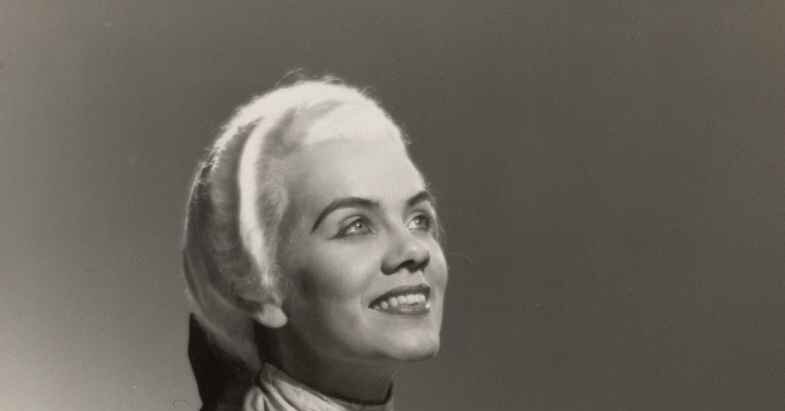The mezzo-soprano Mildred Miller Posvar sang opera’s so-called trouser roles so many times that one of her daughters once told a friend, “My mommy is a boy.”
Ms. Posvar, known in her professional life as Mildred Miller, was Cherubino in Mozart’s “The Marriage of Figaro” a record-breaking 61 times at the Metropolitan Opera House. Her warm, even tone and clear diction became associated indelibly with the composer’s amorous page in the way that Kirsten Flagstad was with Isolde and Feodor Chaliapin with Boris Godunov. She “defined that role for a generation of opera lovers,” Opera News said about her. And there were many other roles as well.
Ms. Posvar died on Nov. 29 at her home in Pittsburgh. She was 98.
Her death was confirmed by her daughter Lisa Posvar Rossi and by the Metropolitan Opera, where she sang in 338 performances, including the title role in “Carmen,” Suzuki in “Madama Butterfly” and Octavian in “Der Rosenkavalier,” which was said to be her favorite.
After her debut at the Met on Nov. 17, 1951, the New York Times critic Noel Straus wrote that she had “scored heavily” as Cherubino and that she had “a handsome magnetic stage presence; a fine, fresh voice expertly produced; and pronounced histrionic ability.”
Ms. Miller would go on to perform with the company for another 23 years; her final performance was on Dec. 3, 1974, as Lola in “Cavalleria Rusticana.” In Europe as well as the U.S., she sang with the greatest stars of her day: Nicolai Gedda, Leontyne Price, Elisabeth Schwarzkopf and others. She was already broadly known in the U.S. by the end of the 1950s, thanks to appearances on television shows like “Voice of Firestone” and “The Bell Telephone Hour.”
Perhaps the highlight of her career was the recordings she made of Mahler’s great orchestral song cycles with Bruno Walter, the magisterial conductor who had given the premiere of one of them.
Walter handpicked the young Ms. Miller for his 1960 recording of “Das Lied von der Erde,” 49 years after giving the first performance in Munich; afterward, according to the 2001 book “Bruno Walter: A World Elsewhere,” by Erik Ryding and Rebecca Pechefsky, he said, “I don’t think we can improve on that.” A 1963 recording she made with Walter of “Lieder eines Fahrenden Gesellen” won the prestigious Grand Prix du Disque in France.
Her reviews were mostly excellent throughout her career, with a few quibbles here and there. “My impression is that she was a really solid singer who sang well and was really important to the company,” said Peter Clark, the former archives director at the Metropolitan Opera. “The kind of solid singer that the Met really depended on. She could sing whatever the Met asked her to.”
Ms. Miller also had a second career, as a leading figure in the artistic life of Pittsburgh, which assumed more importance after her retirement from the Met. In 1967 her husband, Wesley Posvar, had become president of the University of Pittsburgh, and 11 years later Ms. Miller founded, with Helen Knox, the Opera Theater of Pittsburgh, now known as the Pittsburgh Festival Opera, which has been notable in the development of emerging opera stars. The company established the Mildred Miller International Voice Competition in 2011.
Mildred Müller was born on Dec. 16, 1924, in Cleveland, the daughter of immigrants from Germany, Wilhelm and Elsa Müller. Rudolf Bing, the Met’s imperious general manager, later insisted that she Americanize her surname, given the proximity of the war years. Her father owned a household decorating store in Cleveland and was, she later recalled, “very strict” about her piano practicing.
She graduated from the Cleveland Institute of Music in 1946 and from the New England Conservatory of Music, where she studied under the famous midcentury opera conductor and impresario Boris Goldovsky, in 1948. “He taught me to sing and act,” she later said.
She made her opera debut at the Tanglewood Music Festival in the American premiere of Benjamin Britten’s “Peter Grimes” under Leonard Bernstein, who she later said conducted with his fists. She was beginning to be noticed.
When Mr. Bing contacted her for the Met, she turned him down because she wasn’t satisfied with the role he offered. She later turned him down a second time. It wasn’t until the third try that he snagged her, for the role of Cherubino, which she would go on to make her own.
Her husband died in 2001. In addition to her daughter Lisa, she is survived by another daughter, Marina Posvar; a son, Wesley William Posvar; seven grandchildren; and seven great-grandchildren.
Ms. Miller also made her mark in the world of lieder. Critics remarked on the naturalness of her diction in German and, as was typical of music criticism at the time, her striking appearance: She “seems to acquire more of the accouterments of glamour with each passing year,” the critic Allen Hughes wrote in The Times in 1966, going on to offer a mild complaint that her lieder recital had “created a hunger for simplicity,” before offering the condescending observation that “one wondered how Miss Miller would sing these songs if she wore a simple sweater and skirt.”
All that notwithstanding, he concluded, the “recital was virtually flawless from start to finish.”


